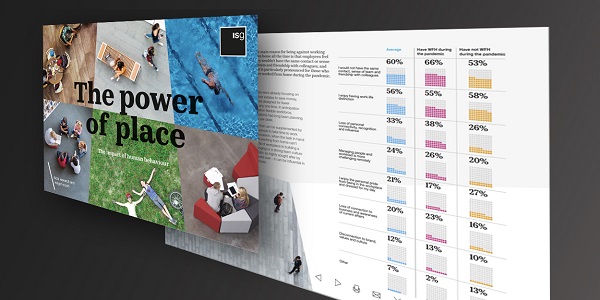
UK workforce needs more time in the office than employers think
Significant shift in sentiment to homeworking revealed in ground-breaking workplace survey.

Staff need on average three days a week (2.91) in the office to achieve maximum productivity, according to a new study by office fit-out and construction specialist, ISG. Key findings from the report include:
- Gen Z and Millennials suffer the most from home working set ups, with almost a third (32%) citing lower productivity and over three fifths (62%) stating poor home working conditions.
- Over a third (35%) of respondents would be likely to leave their current employer if not given the work flexibility asked for.
- Over a third (35%) see socialising as a key driver to return to the office.
- Professional pride dipped 10% for full time remote workers.
In findings from a new UK-wide study examining the future of the workplace, employees believed that spending on average three days a week in the office would be optimal for productivity, compared to the lower average of two and a half days (2.53) a week anticipated by employers. When asked how many days they thought would be needed to optimise their wellbeing, workers cited on average over half a day less, 2.34 days per week, in the office.
The unique survey captured workplace sentiment at the end of last year, before the Covid-19 pandemic hit the UK and then again in September this year after many had worked exclusively from home for around six months. During this period, it was found that professional pride dipped 10% for full time remote workers. Furthermore, those who opted to work from home full time, five days a week, also admitted they were 5% less likely to meet their objectives when compared to those who want to return to the office.
It was also revealed the younger workforce was hit the hardest by working from home, with almost a third (32%) citing lower productivity and over three fifths (62%) stating poor home working conditions. For this age group the opportunity to choose their work flex balance holds huge influence over their likelihood to stay or leave their employer. With two fifths stating they would be more likely to leave if not given the work flex balanced asked for and 70% of Millennials and nearly three fifths (59%) of Gen Z saying they would be more likely to stay if given their requested balance.
Data from the first survey showed the flexibility to work outside the office was of great value to people, with 45% of respondents rating remote working as important, superseded only by plenty of natural light and fresh air. In the follow up survey this September, just 21% of people suggested that being in the workplace five days a week would be optimal for their productivity, which further reduces to just 18% when considering what is best for their wellbeing.
However, 78% of respondents said they would be against working from home five days a week permanently, with two thirds citing they wouldn’t have the same contact or sense of team and friendship with colleagues. Furthermore, when asked what they see are the primary functions of the workplace, socialising and collaborating with colleagues (35%) and training and learning (35%) came out on top.
When examining the benefits of working from home over this period, of the 2,000 respondents, two in three named better work life balance and more time for themselves and family as the overwhelming key benefits. This marked a 12% difference to the second largest priority of saving money due to working from home.
Lee Phillips, managing director for UK fit out at ISG said: “Covid-19 has impacted every single person in the UK and our survey is a unique insight into changing workplace sentiment over a nine-month period of unparalleled societal change. Capturing insights at a moment in time last year of optimism and aspiration, and then resurveying individuals following six months of a global emergency and transformational working patterns is hugely revealing for employers, employees, the built environment, society and future workplace trends.
“These shifts in workplace sentiment will be a crucial consideration for organisations when looking to retain and attract talent, improve productivity levels and nurture the mental wellbeing of staff. Our data shows employees want flexibility to work in the environments that best suit their needs. Over a third of respondents indicated they would be likely to leave their current employer if not given this flex, so employers are on notice that a failure to adapt to the new normal of employee expectations could prove costly to both retaining and attracting the best talent.
“We know that 2020 will prove the catalyst for dynamic change within the workplace. Marrying everyone’s unique experiences of working during the pandemic, with the data driven insights from this ground-breaking survey, provides a powerful lens to drive transformational change across our future workplaces.”
Link to download the survey here.

